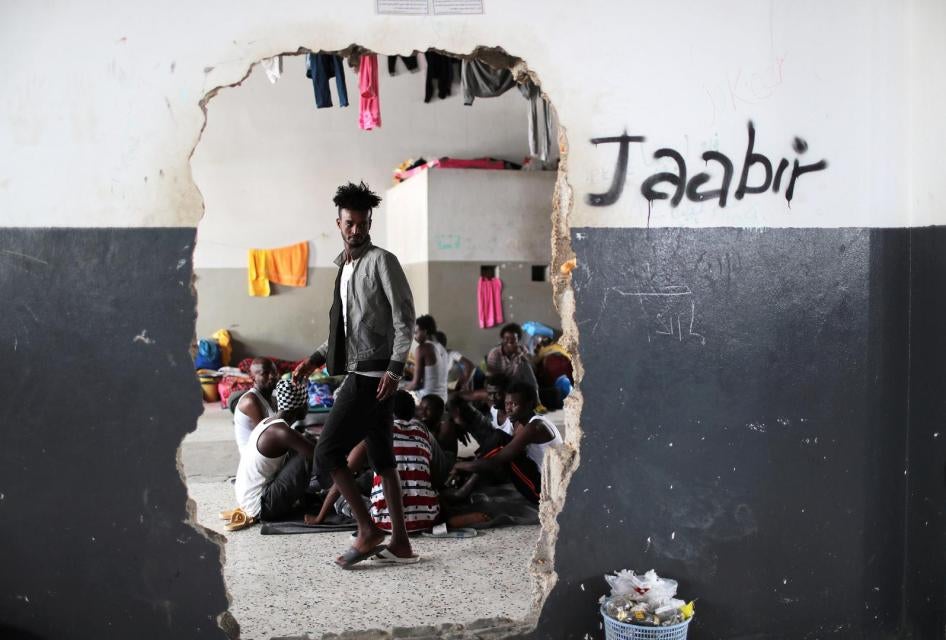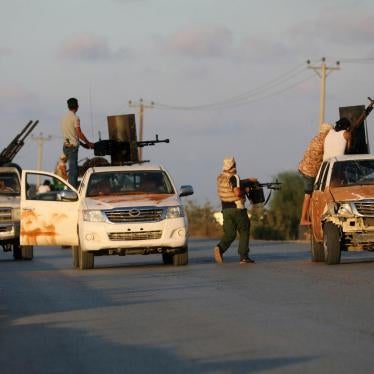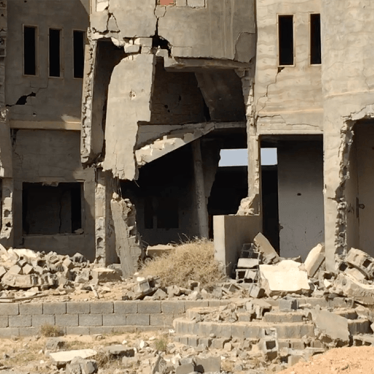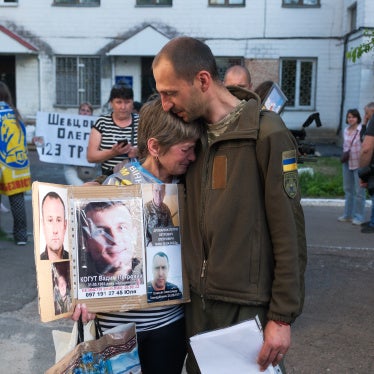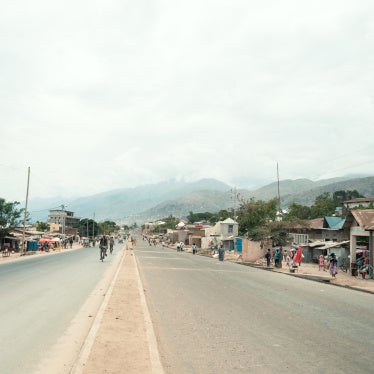(Beirut) – The reported attack by armed men on asylum seekers and migrants in a detention center on April 23, 2019 highlights the growing risk to thousands of detainees during ongoing fighting in Tripoli, Human Rights Watch said today. Forces under the command of General Khalifa Hiftar are battling with militias allied with the United Nations-backed Government of National Accord (GNA).
Some migrant detention centers are located near militia bases – ripe targets for attack during fighting – and GNA-backed militia members have allegedly forced some detained migrants to handle weapons, according to unconfirmed reports. The GNA needs to ensure that migrants and asylum seekers in its custody are moved out of harm’s way and to release all those who are arbitrarily detained.
“Thousands of migrants and asylum seekers detained in appalling conditions now find themselves trapped near or on the front lines of conflict,” said Judith Sunderland, associate Europe and Central Asia director. “Any militia members who force them to handle weapons would compound their nightmare – and might be guilty of war crimes.”
Members of the European Union (EU) and other countries should urge the clashing parties to respect their legal obligations and remove all civilians under their control, including detained migrants, from the vicinity of military objectives. These countries should help to ensure the release or relocation to safety of all migrants in GNA detention centers, including through evacuations out of the country.
About 6,000 migrants and asylum seekers are held in Libyan detention centers, according to UN figures, including over 3,000 deemed at risk of getting caught up in fighting over Tripoli. While only some detention centers are located in or near the capital, many in western Libya are run by local armed groups aligned with the GNA. Detainees are held indefinitely, without judicial review, and exposed to the serious risk of abuse, including torture, deprivation of food and medical care, forced labor, extortion, and sexual violence.
On April 23, armed men attacked detainees at the Qasr Ben Geshir detention center, about 24 kilometers south of Tripoli, according to reports. At least 12 of those injured were taken to the hospital, Amnesty International said, citing the UN refugee agency. Reports describe attackers firing guns but differ over whether any of those injured may have been hit by bullets. It remains unclear who carried out the attack.
Human Rights Watch has gathered information directly and individually from two people who said they were detained at the time in the Tajoura detention center, in an eastern suburb of Tripoli, and a third person who said they were detained in Tarik Al Sikka detention center in the heart of Tripoli. Human Rights Watch is withholding their names to protect them.
The two detainees at Tajoura said that since April 4, armed men had forced them and other detainees at that detention center to work repairing military vehicles at a nearby militia facility, and to load, unload, and clean weapons. One detainee said that the weapons included machine guns, and described being brought by armed men to unload weapons in an area that has seen repeated fighting since April 4, along with other detainees.
At Tarik Al Sikka detention center, in Tripoli, militia members have stored weapons and munitions including shoulder-fired rockets, hand grenades, and bullets in proximity to where detainees are housed, and forced detainees to help move them, one detainee said.
Human Rights Watch has heard credible claims via multiple sources that armed groups in Tripoli have forced detained migrants or asylum seekers to work in similar fashion during past fighting between militias there including in August and September 2018.
Parties to the conflict forcing detained migrants to handle weapons, stockpiling weapons where migrants are detained, and conducting military activities in compounds where migrants are detained would likely violate the laws of armed conflict. Using civilians as human shields or taking hostages would constitute war crimes.
Fighting has occurred since April 4 near several detention centers, according to Human Rights Watch sources and UN reporting. The UN refugee agency has relocated at least 300 detainees from the Ain Zara and Abu Slim detention centers to a UN short-term housing facility since April 9, but has voiced fears for detainees in general and called for all refugees and migrants to be released. As of April 19, it had evacuated 163 detainees by plane to Niger.
As of April 24, authorities at Tajoura detention center had reportedly opened its doors to allow detainees there to leave. On April 24, the UN refugee and migration agencies relocated about 325 detainees from Qasr Ben Geshir detention center, where the previous day’s attack had occurred, to a detention center in Zawiya, a coastal city about 45 kilometers west of Tripoli.
Information on Libya’s migrant detention centers is particularly hard to verify in times of crisis. Even in normal circumstances, GNA authorities tightly control access by UN agencies, nongovernmental organizations, and international researchers. Detainees are wary of talking on the record, citing fear of reprisal.
Hiftar’s forces have seized much of eastern Libya since 2014 in what he calls a campaign against terrorism, and he is allied with a rival government to the GNA that is based there. On April 4, forces under his command, known as the Libyan National Army (LNA), advanced on Tripoli with the stated aim of capturing the city.
At least 278 people have been killed so far in the fighting and 1,332 injured, including at least 21 and 69 civilians respectively, and about 34,975 have fled their homes, according to UN data as of April 25. Fighting appears to have escalated since April 20, with clashes reported in Tripoli’s southern suburbs followed by a nighttime air strike that targeted a militia base there. The base is within one kilometer of the Al Sabaa detention center, where migrants and asylum seekers are currently held, according to Human Rights Watch’s information.
Since 2015, the EU has contributed to the abuse of migrants and asylum seekers in Libya through its support to the GNA-aligned Libyan Coast Guard, which delivers all those it rescues or intercepts to abusive detention centers in Libya.
Meanwhile, armed groups in western Libya have a record of abuses including failing to take measures to protect civilians during fighting, and forcibly displacing people without military need and barring their return. LNA forces have allegedly blocked civilians from leaving areas under siege, burned and looted homes, and carried out summary executions.
The International Criminal Court has issued an arrest warrant for Mahmoud al-Warfalli, a commander in Hiftar’s forces, for his alleged role in the killing of 33 people, and a second warrant for his alleged involvement in another incident. His whereabouts are unknown.
All parties to the conflict should take all feasible precautions to protect civilians, including migrants and any of the thousands of Libyans detained arbitrarily at facilities around the country who might also be at risk; act to remove everyone under their control, including those in custody, from the risk of exposure to armed hostilities; and refrain from forcing migrants to participate in military-related activities or operations.
The EU should move quickly to act on High Representative for Foreign Affairs Federica Mogherini’s pledge to help evacuate detained migrants and asylum seekers out of Libya or relocate them to safer areas inside Libya. That action could include evacuation to Europe.
